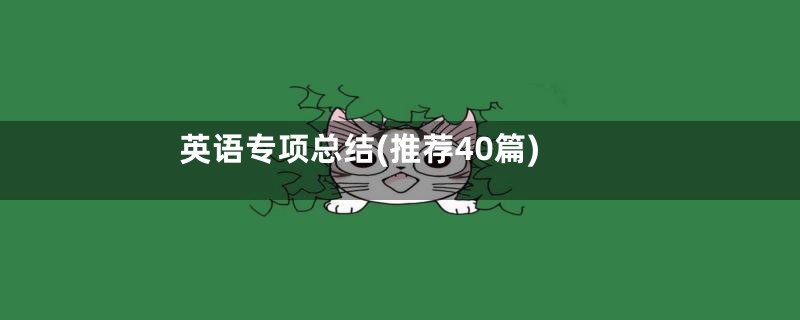英语词性后缀总结(推荐4篇)
- 总结
- 2024-02-07 12:00:12
- 331
英语词性后缀总结 第1篇
1)-an, -ain, 表示_……地方的人,精通……的人”American, historian,
2)-al, 表示_具有……职务的人_ principal,
3)-ant, -ent, 表示_……者” merchant, agent, servant, student,
4)-ar, 表示_……的人” scholar, liar, peddler
5)-ard, -art, 表示_做……的人”coward, laggard, braggart(夸张者)
6)-arian, 表示_……派别的人, ……主义的人”humanitarian, vegetarian
7)-ary, 表示_从事……的人_ secretary, missionary
8)-ate, 表示_具有……职责的人_ candidate, graduate
9)-ator, 表示_做……的人_ educator, speculator(投机者)
10)-crat, 表示xxx种政体,主义的支持者_ democrat, bureaucrat
11)-ee, 表示_动作承受者_ employee, examinee
12)-eer, 表示_从事于……人_ engineer, volunteer
13)-er, 表示_从事某种职业的人, 某地区,地方的人_ banker, observer, Londoner, villager
14)-ese, 表示_ ……国人,…..地方的人”Japanese, Cantonese
15)-ess, 表示_阴性人称名词, actress, hostess, manageress
16)-eur, 表示_……家” amateur, littérateur
17)-ian, 表示_……地方人,信仰…….教的人,从事……职业的人”Christian, physician(内科医生),musician
18)-ician, 表示_精通者, ……家,”electrician, magician, technician
19)-icist, 表示_……家, …….者, …….能手”physicist, phoneticist, technicist
20)-ic, 表示_……者,……师_ mechanic, critic
21)-ie, 表示_爱,指小_ dearie, auntie, lassie(小姑娘)
22)-ier, 表示_从事……职业” cavalier, clothier, brazier(黄铜匠)
23)-ine, ian, 表示_阴性人称_ heroine, ballerina
24)-ist, 表示_从事……研究者,信仰……主义者_ pianist, communist, dentist, artist, chemist
英语词性后缀总结 第2篇
1)-able, -ible, movable, comfortable, applicable, visible, responsible
2)-al, natural, additional, educational
3)-an, ane, urban, suburban, republican
4)-ant, -ent, distant, important, excellent
5)-ar, similar, popular, regular
6)-ary, military, voluntary
7)-ice, -atie, ical, politic, systematic, historic, physical,
8)-ine, masculine, feminine, marine
9)-ing, moving, touching, daring
10)-ish, foolish, bookish, selfish
11)-ive, active, impressive, decisive
12)-ory, satisfactory, compulsory
13)-il, -ile, -eel, fragile, genteel(文雅的)
1)-ish, boyish, childish
2)-esque, picturesque
3)-like, manlike, childlike
4)-ly, manly, fatherly, scholarly, motherly
5)-some, troublesome, handsome
6)-y, milky, pasty
1)-ful, beautiful, wonderful, helpful, truthful
2)-ous, dangerous, generous, courageous, various
3)-ent, violent
1)-en, wooden, golden, woolen
2)-ous, gaseous
3)-fic, scientific
1)-ern, eastern, western
2)-ward, downward, forward
1)-ble, double, treble
2)ple, triple
3)-fold, twofold, tenfold
1)-teen, thirteen
2)-ty, fifty
3)-th, fourth, fiftieth
1)-an, Roman, European
2)-ese, Chinese,
3)-ish, English, Spanish
1)-er, greater
2)-ish, reddish, yellowish
3)-est, highest
4)-most, foremost, topmost
-less, 表示否定,countless, stainless, wireless
加在动词后面
acceptable(可接受的),avoidable(可避免的)
understandable(可理解的),
readable(可读的), countable(可数的),possible(可能的)
2.-al加在地名上
African(非洲的),Australian(澳大利亚的),Canadian(加拿大的)
表示方向
eastern(东方的),northern(北方的),southern(南方的),western(西方的)
表示人
Japanese(日本人),Chinese(中国人),Vietnamese (越南人)
5.-ic加在名词后面
economic(经济的),specific(特殊的),scientific (科学的)
加在名词后面
economical(经济的),historical(历史的), political(政治的)
7.-ish
(1)加在国家名称后面,表示该国的或者该国的人。
Swedish(瑞典的),Irish(爱尔兰的),Danish(丹麦的)
(2)加在普通名词后面,表示“具有……性质”,或者含有轻蔑的意思。
Childish(幼稚的),womanish(女人气的),foolish (愚昧的),selfish(自私的)。
(3)加在表示颜色的形容词后面,表示“略带……颜色的”。Greenish(微绿的),yessowish(微黄色的)。
加在外词后面,构成形容词
annular(环状的),familiar(熟悉的),linear(线的),nuclear(原子的),angular(角的),circular(圆的)
加在名词后面,构成形容词
aged(年长的),cultured(有文化的),skilled(有技术的),talented(有才能的),wretched(可怜的)
加在数词或名词后,构成形容词
twofold(三倍的),threefold(三倍的),tenfold(十倍的),thousandfold(千倍的),manifold(许多倍的)
构成形容词
acid(酸的),acrid(刻薄的)
加在动词后面,构成形容词
appetizing(开胃的),encouraging(鼓舞人心的), exciting(令人激动的),interesting(有趣的)。
加在名词后面,构成与之反义的形容词
armless(无手臂的),boundless(无限的),countless (不可数的),faithless(背信弃义的)
14.-proof加在名词之后,表示“防…的”形容词
airproof(防气的),soundproof(隔音的),bombproof (防炸弹的),burglarproof(防盗的),waterproof(防水的)
加在形容词后,构成形容词
fulsome(过度的,讨厌的),gladsome(愉快的),tiresome(疲惫的),lonesome(孤独的)
构成形容词
various(多种多样的),continuous(继续的), courageous(有勇气的)
17.-en加在名词后面,构成动词
lengthen(加长),frighten(恐吓)
英语词性后缀总结 第3篇
英语词根如下:
act、ceive、cept、cess、ceed、clud、cre、creas、cret、dic、duc、duct、fact、fer、form、ject、lect。
英语词缀如下:
a:表强调。
co:表示“共同一起”。
ent:(a、e替换),表示形容词后缀。
al:形容词后缀或者名词后缀(例:arrival)。
er:表示人或者物。
e:表示“往外”。
it:表示“走”。
in:表示“往里”;表示否定。
pre:表示“在...之前”,等同于fore-。
post:post- 表示“在...之后”。
vac:vac- 表示“空的”。
ful:形容词后缀,表示“充满了”;名词后缀,表示“一把”“少数”。
de:表示强调;表示“下”;表示“负面的”。
ify:动词后缀,表示“使??”。
英语词缀分类如下:
1、前缀+词根:re-(前缀,表示:回)+ port(词根,表示:拿)——>报告,汇报(把消息、情况等“带回来”——>报告)。
2、词根+后缀:ori(词根,表示:升起)+ -ent(在这个单词中是名词后缀)——>orient东方(太阳“升起”的地方——>东方)。
英语词性后缀总结 第4篇
最常见的英语单词后缀:able、age、al等等。
1、-able,形容词后缀。
表示能被...的,可被...的,可以加在许多及物动词之后。ible是able的异体,属于原生词缀,只能加在词根或词干后,有时词根需要经过xxx可以与ible结合。
able的例子:
adjustable,可调节的,exchangeable,可交换的。
classifiable,可分类的,movable,可移动的。
ible的例子:
audible,听得见的,credible,可信赖的。
permissible,可允许的,perceptible,可察觉的,看得出的。
2、-age,名词后缀。
该后缀与年龄age毫无关系,主要有两种用法。
第一种,加在动词后面构成抽象名词,意为该行为或该行为的后果。
breakage,损坏,破损量,marriage,结婚,结婚生活。
postage,邮费,leakage,泄露。
第二种,加在名词后面,表示该事物的群体或与该事物有关的场所,或者表示该事物的状况
baggage,行李,orphanage,孤儿院。
pupilage,学生时期,学生身份,tonnage,吨位。
3、-al,形容词,名词后缀。
本文由admin于2024-02-07发表在叁佰资料网,如有疑问,请联系我们。
本文链接:http://www.sanbaiyy.com/p/13288.html
下一篇
得能勤绩廉总结(优选33篇)











